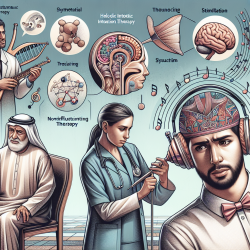Understanding Ambient Experience in Aphasia Recovery
Aphasia, a language impairment often resulting from stroke, affects a significant portion of stroke survivors. While therapeutic interventions are critical, recent research highlights the importance of ambient factors—those outside the direct control of clinicians—in influencing recovery outcomes. The study "Ambient Experience in Restitutive Treatment of Aphasia" provides a comprehensive review of these factors and introduces the Ambient Influences on Outcome Checklist (AOC), a tool designed to help clinicians consider a broader range of influences during treatment planning.
Key Findings from the Research
The study identifies various ambient factors that can act as facilitators or barriers to recovery. These factors are categorized into intra-individual factors, such as pre-stroke conditions like depression and age, and extra-individual factors, including social context and physical environment. Understanding these factors can help practitioners tailor their interventions more effectively, potentially improving outcomes for individuals with aphasia.
Implementing the Ambient Influences on Outcome Checklist (AOC)
The AOC is a practical tool for clinicians to gather comprehensive patient histories, incorporating factors that may have been previously overlooked. By considering elements such as the patient's social support network, cultural background, and living environment, clinicians can develop more holistic and personalized treatment plans.
- Social Context: Positive family and social support have been shown to significantly impact recovery, emphasizing the need for involving family members in the rehabilitation process.
- Physical Environment: Creating a supportive and enriching environment can facilitate better cognitive and language recovery.
- Pre-Stroke Conditions: Factors like previous depression or socioeconomic status can influence recovery trajectories and should be considered in treatment planning.
Encouraging Further Research
While the AOC provides a valuable framework, the study acknowledges the need for further empirical research to validate and refine these ambient factors. Practitioners are encouraged to contribute to this research by documenting outcomes and sharing insights from clinical practice.
For practitioners interested in exploring this topic further, the original research paper offers a detailed analysis and can be accessed here.
Conclusion
Integrating ambient experience into aphasia rehabilitation represents a promising approach to enhancing recovery outcomes. By adopting data-driven strategies and considering a wider range of influences, clinicians can better support their patients on the path to recovery.










